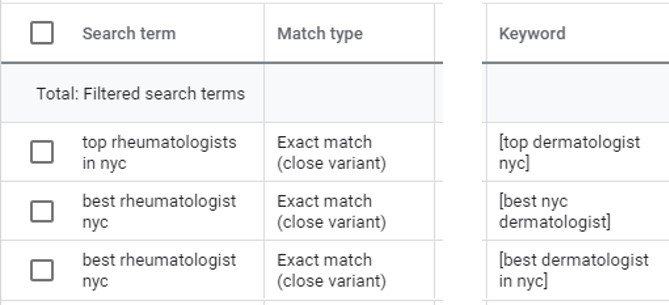Google Ads has announced that it is expanding the close variants feature – which maps together words with the same meaning – to phrase match and broad match modified keywords. Introduced last year, the close variants feature has only been used with exact match keywords to this point.
Keyword match types have always been one of my favorite aspects of PPC marketing. They allow me to tier my bids based on user intent and query relevancy. I use match types to structure my campaigns so that they drive the best return for my clients.
Unfortunately, Google has been slowly weakening the ability to control precisely the search terms that match the keywords bid on.
Originally, the keyword “dermatologist near me” on exact match was much more relevant than the same keyword on phrase match, where a qualifier could be inserted. Sometimes the qualifier – such as “open weekends,” “who speaks Spanish,” “who accepts a particular insurance plan” – does not apply to that particular dermatologist.
The only option is to add those irrelevant phrases to the ad group as negative terms. But it is difficult to proactively guess every unwanted search term variation before you’ve already paid for the click and it shows up in your search query report.
Now Google Ads is expanding the issue into phrase match and broad match modified.
What’s a stake: control of advertising intent and accuracy.
With close variants, keywords can include words that are similar but possibly used by searchers with different intents. Searchers looking for “dermatologist” or “orthopedic surgeon” have different intents than those seeking “dermatology” or “orthopedic surgery.” The first two are more likely to generate a lead for a doctor, while the latter searches are probably in the research phase, farther up the conversion funnel.
Naturally, I want to bid high for converting keywords and low for information seekers. With close variants, my keywords could show for either search intent at any time. I have to create ad-group level negative-keyword lists just to force the less desirable queries to be served low-bid keywords.
Even more frustrating, close variants match to obviously incorrect search terms.

For example, on exact match (close variant), dermatologist keywords can map to rheumatologist queries, as shown above. That’s not even the same field of medicine.
In this instance, Google Ads support suggested that I include every other “-ology” and “-ologist” as negative keywords to prevent the ads from showing for the wrong type of doctor.
Close variants are still producing intent and accuracy issues, and now they’re going to expand it to both phrase match and broad match modified keywords. It just doesn’t make sense, Google.
When exact match started performing unreliably, phrase match became far more important. At least with phrase match, I could be assured that the root phrase of my keywords would appear in the query.
If the close variants feature now applies to all three match types, I’m not sure what that means for the future of my beloved match types. Will there even be a reason to optimize bids across multiple match types? Or will it devolve into an automation free-for-all with negative keywords as our only tool to beat back the errors?
We’ll all find out over the next few months.








